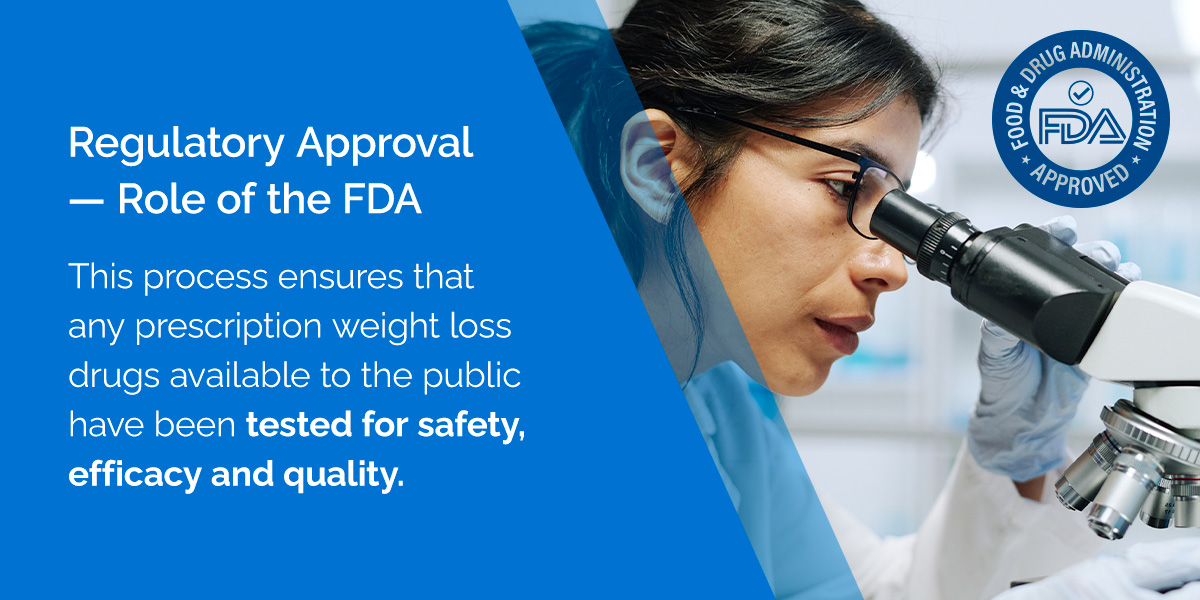Understanding Prescription Medications for Weight Loss

Obesity and weight-related health conditions are on the rise. About 4 in 10 U.S. citizens have a body mass index (BMI) of 30 or higher, putting them in the obese category. A century ago, only 1 in 3 Americans qualified as obese. With such a significant increase, there is a growing concern about maintaining a healthy weight that affects millions medically and cosmetically.
Individuals who are overweight or obese may experience health issues such as diabetes, heart disease and high blood pressure. Furthermore, obese individuals may suffer from a lower quality of life, leading many to seek out ways to improve their situation or regain a higher quality of life. Various methods exist to lose excess weight. While diet and exercise can be effective, medications offer a different approach.
Although some may simply supplement their lifestyle changes with weight loss medications, other individuals will need to rely on prescription weight loss drugs recommended and prescribed by their medical providers. If you're unfamiliar with this concept, consider this article as your quick-start guide to prescription medications for weight loss.
Understanding how these medications work is the first step toward making informed decisions about their use. You may better comprehend their mechanisms, types and other practical considerations for these medications, such as the legal and regulatory landscape and insurance coverage.
The Growing Need for Weight Loss Solutions

Obesity has reached great proportions, becoming a common, chronic disease affecting adults and children alike. In America alone, about 33% of adults (individuals 18 years and older) were classified as obese in 2022. West Virginia showed the highest prevalence of obesity, followed by Louisiana and Oklahoma.
The numbers are also increasing for children and adolescents. In 2019, research predicted that over 250 million children will be obese in 2030. However, post-pandemic research is showing that even more children will be obese by 2030.
Such rising numbers highlight the urgent need for effective weight loss solutions. Although obesity is partially a cosmetic concern, it's also linked to many serious health conditions. Individuals with obesity may develop type 2 diabetes or heart disease and be more susceptible to stroke and certain types of cancer. Additionally, obesity can reduce the quality of life. It may lead to mental health issues like depression and a higher likelihood of physical issues like joint problems and sleep apnea.
Furthermore, medical statuses like being overweight or obese have a measurable economic impact. Higher numbers of individuals who are overweight or obese place a greater strain on healthcare systems and can reduce workforce productivity. In turn, such an effect may exacerbate direct costs like medical expenses for treating obesity-related conditions and indirect costs such as absenteeism, reduced productivity and premature death.
As these severe health implications come to light, effective weight management becomes crucial. This is where weight loss medications come into play. Weight loss medications offer a viable option for those who struggle to lose weight through diet and exercise alone.
How Do These Prescriptions Aid in Weight Loss?
Healthcare providers prescribe weight loss medications to help individuals maintain a healthy weight based on their medical history and particular health challenges. These medications are for those who struggle to lose excess weight through diet and exercise alone and are often used in conjunction with these lifestyle changes. These medications aim to reduce body weight and improve overall health — often to manage specific health issues such as diabetes.

Prescription weight loss drugs work in various ways, depending on the specific medication. Some suppress appetite, while others block fat absorption or enhance the body's ability to burn calories. Note that there are fundamental differences between prescription and over-the-counter (OTC) weight loss medications. Key differences lie in the regulation, safety and efficacy of each.
Prescription weight loss drugs undergo rigorous testing and approval processes. The U.S. Food and Drug Administration (FDA) is one of the regulatory bodies primarily responsible for these processes. Providers prescribe these medications based on careful evaluation of an individual's health needs and medical history, and they are part of a personalized approach to weight management.
OTC weight loss drugs are available without a prescription. They often contain lower doses of active ingredients or different compounds altogether. While some OTC options can be effective for short-term weight loss, they may not offer the same efficacy and safety as prescription medications. Additionally, OTC weight loss medications may not be suitable or sustainable for everyone. This is particularly the case for those with underlying health conditions.
Who Can Benefit From Prescription Weight Loss Drugs?
Prescription weight loss drugs are not a one-size-fits-all solution. They are specifically designed for individuals who meet specific medical criteria. Eligible individuals for these medications typically are only adults with a BMI of 30 or higher. In other words, those medically categorized as obese. These medications may also be appropriate for individuals with a BMI of 27 or higher who also have obesity-related health issues or other complicating factors.
Healthcare providers consider an array of factors to ensure safety and appropriateness. For instance, pregnant individuals are typically advised against using these drugs due to the potential risks they may pose to the fetus. Moreover, these medications' efficacy and safety may vary among different demographics. As such, medical practitioners will consider age and sex among the criteria to carefully guide their prescription decision-making.
These medications should be considered part of a broader weight management plan. For those who qualify, prescription weight loss drugs can be an effective tool to help combat obesity.
How Prescription Weight Loss Medications Work
These medications use various mechanisms to aid in weight reduction. Let us explore the three main ways they work.

1. Appetite Suppression
One of the most common mechanisms of weight loss medications is appetite suppression. These medications influence the brain's neurotransmitters to reduce feelings of hunger and increase feelings of fullness. Essentially, these medications help patients feel satisfied with less food, making it easier to stick to a reduced-calorie diet.
Take bupropion-naltrexone, for example. This is a combination drug where bupropion, an antidepressant, and naltrexone, a medication used for addiction treatment, work together to curb appetite. These medications function by adjusting the brain's reward center and inhibiting hunger cues. As a result, they often help decrease food intake, leading to weight loss over time.
2. Fat Absorption Inhibition
Another effective mechanism is the inhibition of fat absorption. Orlistat, known by the brand names Xenical and Alli, is a prominent example. Orlistat blocks the enzyme lipase, which is necessary for the breakdown and absorption of dietary fats. If lipase is blocked, a considerable amount of the fat eaten will not be broken down by the digestive system and will be expelled from the body as waste.
This medication directly reduces calorie intake by targeting the body's ability to process fats. This reduction in fat absorption means fewer calories are taken up by the body, aiding in weight loss. However, following a low-fat diet while taking Orlistat is essential to minimize side effects such as gastrointestinal discomfort.
3. Hormonal Regulation
Hormonal regulation is another sophisticated approach employed by some weight loss medications. GLP-1 receptor agonists, such as Semaglutide (brand name Wegovy), use this mechanism. GLP-1, or glucagon-like peptide-1, is a crucial hormone in appetite management and glucose metabolism.
Semaglutide mimics the action of GLP-1, leading to several beneficial effects for weight loss. It slows gastric emptying, which means food stays in the stomach longer, enhancing feelings of fullness or satiety. It also reduces appetite and increases insulin secretion in response to meals, which can help maintain steady blood sugar levels. GLP-1 receptor agonists provide a thorough strategy for weight control by targeting both appetite and metabolic functions.
Types of Prescription Weight Loss Drugs

Prescription weight loss drugs have come a long way, from stimulant drugs to advanced medications. This evolution reflects our deeper understanding of obesity and improved treatment options.
First-Generation Drugs — Historical Context and Issues
The earliest prescription weight loss drugs primarily included stimulants, such as phentermine. These medications suppress appetite by stimulating the central nervous system — similar to how amphetamines or caffeine work. In the 1950s and 1960s, drugs like phentermine and fenfluramine became popular. They were often prescribed in combination, famously known as "Fen-Phen."
However, understanding the use of stimulant drugs for weight loss also requires acknowledging their drawbacks. These drugs were associated with severe side effects, including increased heart rate, heightened blood pressure and potential for addiction and abuse. Fen-Phen, in particular, was linked to serious heart valve issues, leading to its eventual withdrawal from the market.
Despite their appetite suppression effectiveness, the risks and side effects necessitated the development of safer alternatives.
Second-Generation Drugs — Introducing Combination Therapies
In response, the next wave of prescription weight loss medications focused on combination therapies that provided enhanced safety and efficacy. Two notable examples are Contrave and Qsymia.
Contrave combines bupropion and naltrexone. Bupropion, an antidepressant, helps people quit smoking. At the same time, naltrexone helps treat dependencies on alcohol and opioids. Together, these drugs can help recalibrate the brain's reward system to reduce hunger and control cravings. This effect addresses the physiological and psychological aspects of eating.
Qsymia combines phentermine, a first-generation stimulant, with topiramate, a medication used to treat epilepsy and migraines. This combination helps reduce appetite while also inducing a feeling of fullness. Including topiramate in the mix helps mitigate some of the stimulant's side effects, helping Qsymia offer a more balanced approach to weight management over first-generation weight loss drugs.
These second-generation drugs marked a significant improvement in addressing obesity with fewer side effects compared to their predecessors. However, the quest for even more effective and safer treatments continued.
Today's Drugs — Advanced Options and New Approvals
The latest generation of medications embodies a substantial leap forward in obesity treatment. These drugs offer a new mechanism of action — hormonal regulation and metabolic effects. GLP-1 receptor agonists are at the forefront of this new approach.
GLP-1 receptor agonists, such as Semaglutide (Wegovy), mimic the action of the GLP-1 hormone. This hormone is involved in appetite regulation and glucose metabolism. These drugs slow gastric emptying, helping patients feel full and sated for longer, and help control blood sugar levels. Semaglutide has shown impressive results, with many patients experiencing substantial weight loss.
Another notable advancement is the recent approval of Zepbound (tirzepatide). This medication targets two hormones, GLP-1 and GIP (glucose-dependent insulinotropic polypeptide), and aims to enhance weight loss and metabolic control, partly by reducing appetite and food intake. Clinical trials have demonstrated significant weight reduction in patients using Zepbound. These results make it a promising option for those struggling with obesity.
FDA-Approved Weight Loss Drugs
The FDA has approved several weight loss drug options that cater to different needs and provide different mechanisms of action. Here's an overview of some of the most commonly prescribed FDA-Approved weight loss medications:

- Orlistat (Xenical, Alli): A fat absorption inhibitor. Orlistat inhibits the enzyme lipase to reduce fat absorption in the intestines. It's best for patients who prefer a non-systemic option.
- Contrave (Bupropion-Naltrexone): A combination drug. Contrave combines an antidepressant and an anti-addiction medication to help control cravings and hunger. Those who participated in the Contrave clinical trials lost about 5% of body weight and kept it off.
- Saxenda (Liraglutide): A GLP-1 receptor agonist used initially for diabetes. Saxenda mimics the hormone GLP-1 to regulate appetite and slow gastric emptying. The majority of Saxenda users, about 60%, lost 5% or more of body weight.
- Qsymia (Phentermine-Topiramate): Also a combination drug. Qsymia combines a stimulant with an anticonvulsant to reduce appetite and promote fullness. After a year's use, about 70% of Qsymia users lost at least 5% of body weight.
- Wegovy (Semaglutide): Another GLP-1 receptor agonist with significant weight loss effects. It mimics GLP-1 to increase feelings of fullness and decrease hunger. A two-year analysis showed that 68% of Wegovy users lost at least 5% of body weight.
- Zepbound (Tirzepatide): A new dual-hormone agonist. It targets GLP-1 and GIP to reduce appetite and improve metabolic control. The FDA cited an 18% body weight reduction in Zepbound users who had been taking it for over a year.
The Role of Healthcare Providers in Obesity Management
Healthcare providers play a crucial role. Their expertise helps during patients' assessments, prescriptions, ongoing monitoring and support. All these are critical to the success of obesity treatment plans. Let's discuss these in further detail.
1. Assessment and Prescription

The initial step involves a thorough assessment by healthcare providers. This process includes taking a detailed medical history, conducting a physical examination and often, a discussion about previous weight loss attempts.
Providers consider factors such as the patient's BMI, the presence of obesity-related conditions, and overall health to determine whether prescription weight loss drugs are appropriate.
This initial decision-making process is crucial. It helps ensure that the prescribed medication will be effective and safe for the patient.
2. Monitoring and Support
Once a prescription is made, the healthcare provider shifts towards ongoing monitoring and support. Medical providers will conduct regular follow-ups. The goal of these follow-ups is to assess the medication's effectiveness and check for any potential side effects.
These appointments allow providers to adjust the dosage, try different medications if necessary and reinforce the importance of complementary lifestyle changes such as diet and exercise.
This continuous support helps patients navigate the challenges of weight loss and maintain motivation over the long term.
3. Personalized Treatment Plans
A key aspect of obesity management is the personalization of treatment. Healthcare providers tailor weight loss plans to fit individual needs. They'll account for factors like age, sex, health conditions and personal preferences.
This customization may enhance the effectiveness of treatment, as it addresses specific barriers to weight loss that an individual may face.
For instance, a treatment plan for a young adult might focus more on integrating physical activity and managing calorie intake. On the other hand, an older patient might need adjustments for metabolic changes and existing health conditions.
One must know the legal and regulatory frameworks governing these medications' approval and use.
Regulatory Approval — Role of the FDA

The FDA plays a pivotal role in the approval of weight loss drugs. This process ensures that any prescription weight loss drugs available to the public have been tested for safety, efficacy and quality. The FDA evaluates clinical trial data to determine whether a drug's benefits outweigh its risks.
They'll then decide on the medications' approval based on their findings. This rigorous scrutiny helps protect patients from potential harm and ensures the medications they use are safe and effective.
Ethical Considerations — Ensuring Fair Access and Informed Consent
Ethical considerations are vital in the distribution and administration of weight loss medications. These drugs must be affordable and accessible to those who need them most without bias or discrimination.
Furthermore, informed consent is a critical aspect of the ethical distribution of these medications. Patients must be informed about the potential risks and benefits of a medication. This information will allow them to make knowledgeable decisions about their healthcare.
Legal Implications — What Patients Should Know
Patients should be aware of the legality of obtaining and using these drugs. A licensed healthcare provider must prescribe prescription weight loss medications. These medications should never be purchased through unauthorized channels, as this may lead to the use of counterfeit or unsafe products.
Additionally, patients should understand the importance of adhering to the prescribed treatment regimen. They should also understand not to share prescription medication with others, which is both illegal and potentially harmful.
Navigating Insurance Coverage for Weight Loss Medication
You'll need to understand the financial aspects of prescription weight loss drugs. The costs can vary widely, and navigating insurance coverage can be complex. Let's briefly navigate this process together.
Cost Factors
The cost of prescription weight loss medications can depend on several factors. These can include the type of drug, dosage level and the expected duration of the treatment. Some newer medications might be more expensive due to their recent development and market entry — and, therefore, a dearth of generic options. Without health coverage, these costs can become a significant burden for patients.
Insurance Coverage
Understand that insurance coverage for prescription weight loss drugs may be inconsistent. Some insurance plans cover these medications under their prescription drug policy. In contrast, others may exclude them — categorizing them as lifestyle or cosmetic drugs, or only medically necessary in specific contexts (such as to treat type 2 diabetes or manage blood sugar).

Patients must thoroughly review their insurance policy and speak directly with their insurer or health plan to understand what is and isn't covered. In cases where medications are not covered, advocacy for coverage through appeals might be necessary. This process may involve providing documentation from healthcare providers about the medication's necessity for patients' health.
Alternative Financial Options
There are alternative financial options for patients facing high costs with little or no insurance coverage. Some pharmaceutical companies offer manufacturer assistance programs or discounts for their medications. Additionally, generic versions of some drugs may be available at a lower cost. Exploring these options can provide financial relief, making treatment more accessible. However, we cannot stress enough how vital it is to consult a healthcare provider regarding alternative medications before taking anything other than what is specifically prescribed.
Learn How The Phia Group Can Help
These drugs may help with obesity and related health conditions. Prescription weight loss drugs have evolved significantly, now offering more effective and safer options than ever before. Despite these advancements, patients still need professional guidance. Consulting with healthcare providers is essential to tailor a treatment plan that aligns with individual health needs and goals.
For organizations looking to manage healthcare costs effectively — especially in providing employee benefits — The Phia Group extends a helping hand. Our cost-containment solutions and deep industry knowledge can help employers and employees navigate healthcare coverage's quirks and complexities — including treatments like blockbuster new weight loss medications.
By partnering with us, you can ensure your health plans are affordable and comprehensive. We want to empower you to take control of your organization's healthcare spending. Contact us today and learn how we can help reduce and control employee healthcare benefits costs.
